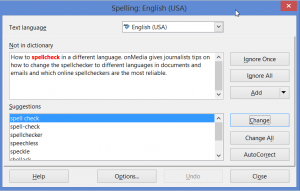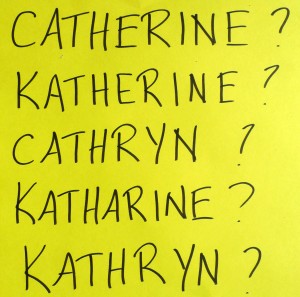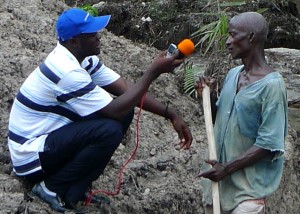Connecting journalists with hostwriter
 You’re planning your next overseas assignment. You’re looking for strong story ideas, good contacts with expert local knowledge, and maybe a couch or bed in the spare room of a journalist-friendly house to keep travel costs down. If this sound familiar, then the soon to be launched international journalism network called hostwriter might be an answer.
You’re planning your next overseas assignment. You’re looking for strong story ideas, good contacts with expert local knowledge, and maybe a couch or bed in the spare room of a journalist-friendly house to keep travel costs down. If this sound familiar, then the soon to be launched international journalism network called hostwriter might be an answer.
Hostwriter is the brainchild of German journalists Tabea Grzeszyk, Tamara Anthony, Sandra Zistl. The pitch is simple: find a story, find a colleague, find a couch.
The aim of hostwriter is to create a network of professional journalists around the world who can help each other, share information and contacts, collaborate to produce stories together, or even let a colleague stay in their home.
![]() read more
read more
How to spell check in different languages

As an editor, I am surprised at how often reporters send me articles that they obviously haven’t run through a spell checker beforehand. And it’s usually journalists who work in a language other than English who fail to spell check – even though they might need all the English spelling help they can get.
With so many free tools and dictionaries available online, there is really no excuse. A reporter’s job is all about getting the facts correct. And if you send off an article, script or even an email full of spelling mistakes to your editor, how can they trust you to get the other facts right?
onMedia offers some tips on how to change the spell checker to different languages in documents and emails and which online spell-checkers are the most reliable.
![]() read more
read more
Journalists@Work: Titilayo Dzabala in Malawi
 Titilayo Kumilonje Dzabala is an online journalist for the Malawi Broadcasting Corporation (MBC), the country’s state broadcaster. She studied English literature and philosophy at university in Malawi’s commercial capital, Blantyre, where she grew up and still works. The twenty-six year old didn’t plan on becoming a journalist. But now she’s been in the job for more than four years, she loves it – mainly because of the chance it gives her to tell people’s stories. Tech-crazy, Titilayo dreams of one day producing more multi-media content and spending more time blogging about the stories that matter to her. Titilayo talked to onMedia’s Kate Hairsine about the excitement of constantly learning, why she loves editing and how shooting video can drive her crazy.
Titilayo Kumilonje Dzabala is an online journalist for the Malawi Broadcasting Corporation (MBC), the country’s state broadcaster. She studied English literature and philosophy at university in Malawi’s commercial capital, Blantyre, where she grew up and still works. The twenty-six year old didn’t plan on becoming a journalist. But now she’s been in the job for more than four years, she loves it – mainly because of the chance it gives her to tell people’s stories. Tech-crazy, Titilayo dreams of one day producing more multi-media content and spending more time blogging about the stories that matter to her. Titilayo talked to onMedia’s Kate Hairsine about the excitement of constantly learning, why she loves editing and how shooting video can drive her crazy.
![]() read more
read more
Journalists need to get better at spelling names
 Journalists (and experienced ones at that) often misspell people’s names. This doesn’t just make reporters look sloppy, it also raises doubts about the accuracy of the other information in the report. In the first of two posts about spelling, onMedia’s Kate Hairsine gives some tips on how journalists can spell people’s names right.
Journalists (and experienced ones at that) often misspell people’s names. This doesn’t just make reporters look sloppy, it also raises doubts about the accuracy of the other information in the report. In the first of two posts about spelling, onMedia’s Kate Hairsine gives some tips on how journalists can spell people’s names right.
![]() read more
read more
Local news site network growing fast in Asia
 English speakers in big Asian cities can buy English-language newspapers but many still want more detailed information about what’s happening in their own neighborhoods. That was an unfilled niche that American journalist Byron Perry saw in his adopted city, Bangkok. In 2011, he launched Coconuts out of his apartment to provide local news in English. Now he’s got sites in five Asian cities and big plans for the future.
English speakers in big Asian cities can buy English-language newspapers but many still want more detailed information about what’s happening in their own neighborhoods. That was an unfilled niche that American journalist Byron Perry saw in his adopted city, Bangkok. In 2011, he launched Coconuts out of his apartment to provide local news in English. Now he’s got sites in five Asian cities and big plans for the future.
![]() read more
read more
Tools & Apps for Journalists: Meograph
What is Meograph?
 Meograph is a web-based multimedia tool that makes it simple to put together different elements such as video, photos, audio, narration, music, text and links to tell a story. What is especially nice about this tool is the ability to plot the changing location of events on Google maps and to also pin events to a timeline. The final product has similar dimensions to a YouTube video and also comes with a play, pause and stop button. Meograph embeds easily in websites or social media making it easy to share.
Meograph is a web-based multimedia tool that makes it simple to put together different elements such as video, photos, audio, narration, music, text and links to tell a story. What is especially nice about this tool is the ability to plot the changing location of events on Google maps and to also pin events to a timeline. The final product has similar dimensions to a YouTube video and also comes with a play, pause and stop button. Meograph embeds easily in websites or social media making it easy to share.
![]() read more
read more
Top 5 mistakes recording audio
 Many journalists don’t record audio as well as they should. Be it in radio or video production, recording good sound can make or break your story.
Many journalists don’t record audio as well as they should. Be it in radio or video production, recording good sound can make or break your story.
Below you can hear examples of some of the most common mistakes journalists make when recording audio. Once you’ve heard how these mistakes sound on tape, it should be easier to avoid them yourself.
![]() read more
read more
Tools and Apps for Journalists: Listly
![]()
List.ly makes lists with a twist. It’s a web tool that lets you make collaborative lists. Think of them as interactive or living lists. A list generated in Listly doesn’t stay rigid or static. Users can not only view and share the list, but they can also add to it and give the list a ranking.
Listly recently integrated Twitter lists to its service. That’s what caught our eye. A public Twitter list remains useful when new sources are added and redundant ones “pruned”. Potentially, Listly could help make Twitter lists not only more useful in newsrooms but also offer a form of social media content that could attract a larger audience.
![]() read more
read more
Staying professional during interviews, even when it’s tough

Emblem of the GDR’s Stasi secret service (photo: flickr/elmada)
Journalists talk to a wide range of people, sometimes even those whose actions we find morally reprehensible. But it’s crucial to stay professional during an interview—even with someone you might consider a monster. As part of our series on hardest interviews, onMedia’s Kyle James remembers his struggle to keep personal feelings from derailing a talk with a former official of East Germany’s secret police, the Stasi.
![]() read more
read more
Quick tips on searching for Twitter lists
 Twitter lists are an essential social media research tool for journalists. If you’re working a particular beat and need to follow updates from people on a certain topic, creating your own Twitter list or subscribing to the public list curated by someone else can save a lot of valusble time.
Twitter lists are an essential social media research tool for journalists. If you’re working a particular beat and need to follow updates from people on a certain topic, creating your own Twitter list or subscribing to the public list curated by someone else can save a lot of valusble time.
But how do you go about searching for good Twitter lists or refining your search for specific information within a Twitter list?
Here are a few quick search tips to try.
![]() read more
read more







